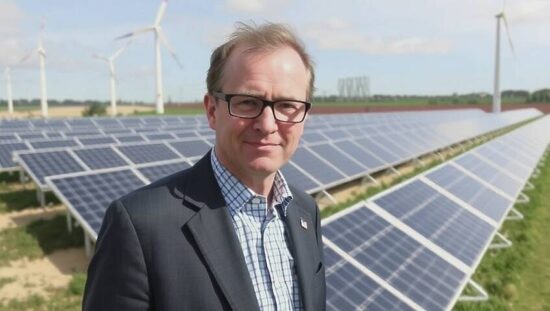Vattenfall’s Germany CEO, Robert Zurawski, has expressed support for the construction of photovoltaic panels on farmland and between wind turbines. “We see great opportunities in Agri-PV”he told the Funke-Mediengruppe newspapers, referring to a project of his company in the small town of Tützpatz in Mecklenburg-Vorpommern.
Zurawski emphasized that the construction of solar panels over agricultural land would only be possible for crops that can grow in partial shade. “We can also better utilize areas between wind parks”he said, citing examples from the Netherlands and the UK where solar panels are already being installed. In Germany, however, such projects face regulatory hurdles.
Vattenfall currently has solar park projects with an output of eight gigawatts in the planning stages, with five large solar parks already under construction in Germany. “We will invest heavily in the coming years and aim to build up to one gigawatt per year”Zurawski announced, adding that the company is already planning its solar parks without relying on the EEG subsidy. Instead, it will focus on power purchase agreements with industry.
Such agreements offer investment security, stable prices and risk diversification, making them attractive to companies. In the end-user market, the development of own energy storage will become more relevant. “The topic of EEG surcharge may lose significance in the coming years. What’s important is that the installation of a photovoltaic system remains economically viable”he explained.
The EEG subsidy for renewable energy has been a contentious issue in Germany, with the surcharge on electricity bills criticized for being too high. The government has announced that the EEG surcharge will be abolished in 2023, to be replaced by a direct funding model from the federal budget.
Zurawski did not explicitly call for the end of the EEG subsidy, but rather emphasized the need for renewable energy to be priced competitively. “This would reduce the economic viability of some installations, but on the other hand, renewable energy should be able to respond to prices”he said.
The Vattenfall CEO also highlighted the importance of negative electricity prices, which occur when more electricity is generated than can be consumed, forcing utilities to pay customers to take the excess power. He sees this as an incentive for the company to invest in energy storage, which would also have a significant impact on prices.
“Renewable energy already has a price-dampening effect in the electricity market. The challenge is flexibility, as storage must grow in tandem. If it is not cost-effective, it will be difficult”he explained, calling for faster grid connections and clear political guidelines to facilitate the rapid development of energy storage.





